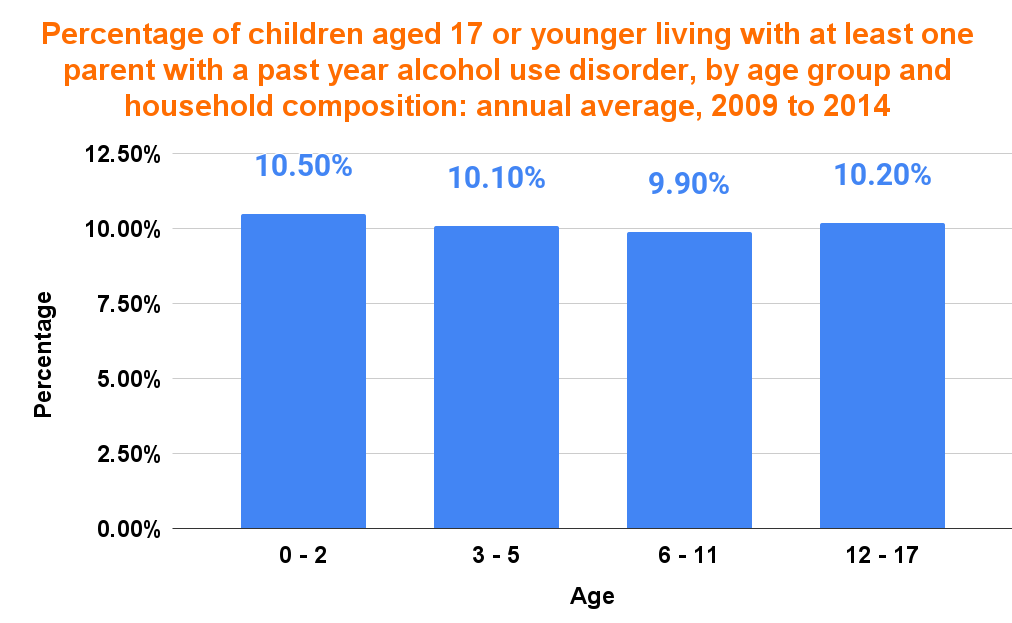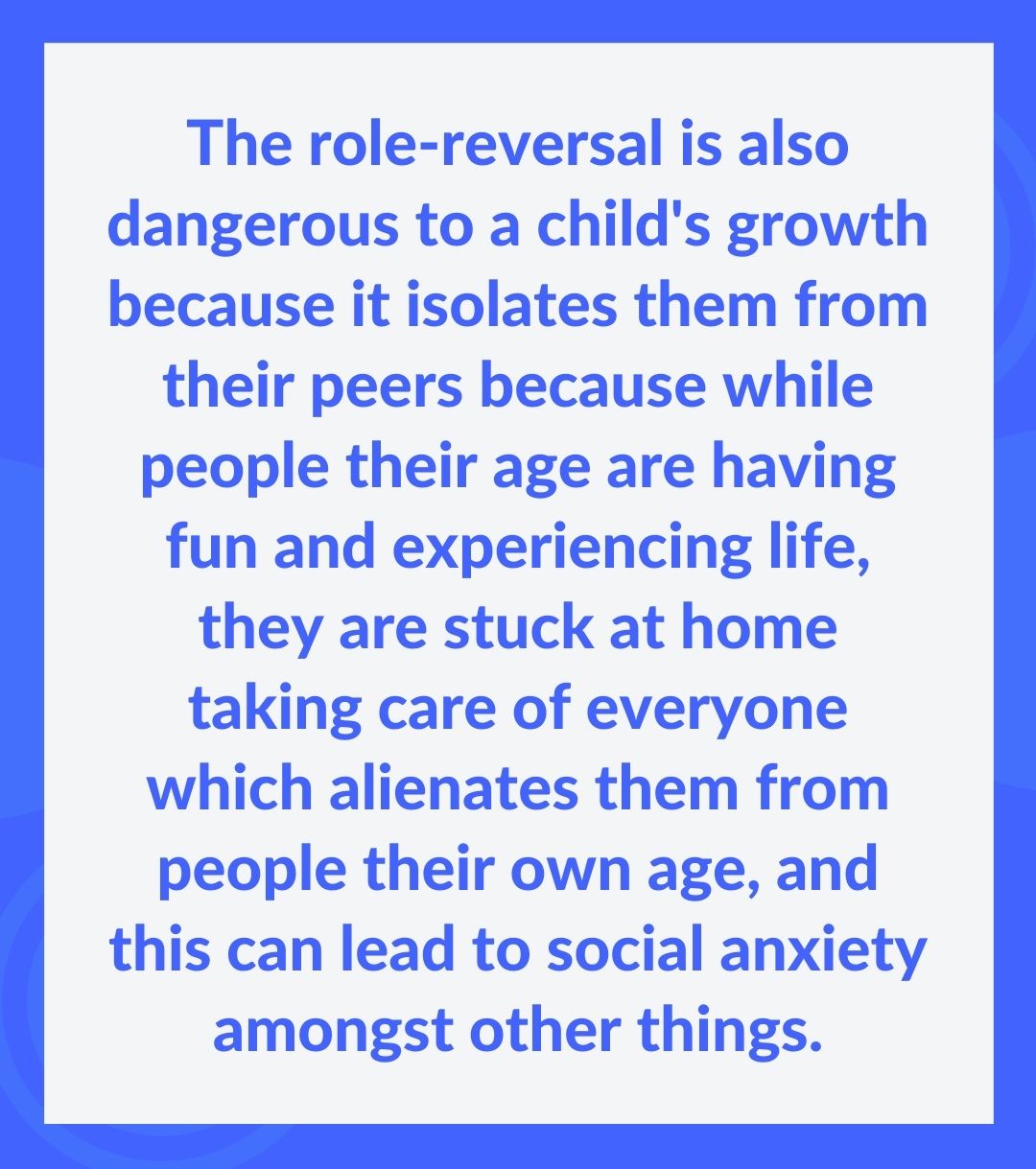13 Effects of Growing up with an Alcoholic Father
WhatToGetMy Instructional Article
There are dire and long-lasting effects of alcoholic father on daughter and son alike. In a paper written by Rachel N. Lipari, Ph.D., and Struther L. Van Horn, M.A. It was reported that over 8 million children in the United States live in a household where at least one of the parents has a substance abuse disorder.

This article explores the effects that could befall (and have befallen) children who are raised in an environment where their father was an alcoholic. We discuss how this can change and affect their lives both in childhood and adulthood.
1. HIGHER RISK OF BECOMING ALCOHOLICS
Studies have shown that one of the ways in how alcoholism affects children is the increased risk of them becoming alcoholics in later years. This is because for most of them, alcoholism becomes the norm and they grow up thinking it is the only way they can cope with being neglected, or facing emotional and physical abuse from their alcoholic parents. The effects of alcohol on children surpass their childhood and well into their adulthood with most of them needing therapy to overcome the damage that their parents’ alcoholism may have impacted on them in order to avoid negative coping mechanisms.
2. DEPRESSION AND OTHER MENTAL HEALTH PROBLEMS
Some of the most common side effects of alcoholism on children are that it leads to depression and other related mental health issues such as anxiety, obsessive-compulsive disorders (OCD), and post-traumatic stress disorders (PTSD) just to mention a few. This is because when you live with a drunk father, as a child you begin to notice things that upset him when he is drunk and things that trigger him to violence of some form and you begin to avoid those things just so you do not upset him. This may lead the children, especially the eldest, to grow up fast and take care of everyone around them because their parent isn’t because as a ripple effect, when the father is an alcoholic, the mother usually neglects her children to take care of her husband, or she suffers the abuse along with her children but in most cases, the woman will sacrifice one of her children to deal with the abuse and become a dormant parent – thereby neglecting her children. Here are some effects of living with an alcoholic spouse.
Children of alcoholic parents are more often than not abused (physically and mentally) and neglected, all of which impedes on their emotional growth and this can have serious consequences on the children both in their youth and adult life.
3. PHYSICAL VIOLENCE
Long-term effects of alcoholism on children appear when they have been physically violated by their parent who is an alcoholic. Physical violence can scale anywhere from getting shoved around and getting slapped, to being beaten down. It is a well-known fact that alcohol makes people violent and when the person is an adult who is responsible for young children, they may end up taking out their frustration on them. The effects of an alcoholic parent on child development come into play when physical violence is inflicted upon the child because it leaves lingering effects that follow the child to adulthood that they may possibly need therapy for.
4. FEELING ABANDONED/NEGLECTED
This is a particularly tricky situation because a neglected child is a vulnerable child and most often than not it leads to the children seeking constant reassurance or approval from other people. This is dangerous because it can lead children down dangerous paths such as seeking male/adult approval thereby falling victim to pedophiles and other sexual predators because they are being promised love and affection, which they do not receive from their own father in their homes.
5. INCREASED CONFLICT
There is a hot-headed dynamic between the sons of alcoholic fathers and their alcoholic fathers especially when the sons are older, usually starting in their teen years. This is a result of frustration from the child and loss of control from the father. As the child grows up in an environment that he dislikes and does not approve of, he eventually gets frustrated and is no longer willing to put up with his father and enable him to neglect and/or abuse those around him. On the other hand, the father feels that he is losing his power and control over his family or to his son and this will create a very tense conflict home environment.
6. FINANCIAL ISSUES
Children of an alcoholic father’s often grow up lacking when it comes to financial stability. This is because their father would rather buy himself alcohol than financially take care of his family. This may present itself as the children not having enough to eat, not having presentable clothes, etc. Financial issues also arise when the father is being emotionally and financially abusive to his wife – he may be taking away his wife’s money and using it to buy alcohol, or he may even convince his wife to quit her job and be a stay at home mom so he can be the sole provider of the family – and when he fails to do so, blames it on her.
7. TRUST ISSUES
Growing up with an abusive alcoholic father can lead to the children having trust issues in their life which makes it harder for them to make friends, or have meaningful long-term relationships. This is because most alcoholics will promise that they will change, and they do for a while, but without seeking proper help, this never lasts and they go back to binge drinking and abusing their families. This creates a sense of false hope in the children at first but as it happens more frequently, the children start seeing a pattern and soon they will stop believing their father when he says he will stop drinking and become a better father. This registers in their brain as “people cannot change” or “people will always let you down” and therefore they go through life believing that everyone is lying to them and they will sooner or later disappoint them, just like their father did.
8. ROLE REVERSAL
Kids with alcoholic parents are often forced to grow up too soon, either to take care of themselves or to take care of their alcoholic parent or even the parent who isn’t an alcoholic but has suffered abuse from the alcoholic parent. This leads to children taking on the parental role at a very young age; washing after themselves and their parents, making sure everyone is fed, and the house is clean, and other such duties. This may seem harmless at first glance but looking at it deeper, the child is robbed off their childhood and this can have serious repercussions in the future when they will most likely go through a midlife crisis where they will act and do things that they couldn’t do when they were young.
The role-reversal is also dangerous to a child’s growth because it isolates them from their peers because while people their age are having fun and experiencing life, they are stuck at home taking care of everyone which alienates them from people their own age, and this can lead to social anxiety amongst other things.

9. ABUSE (SEXUAL, EMOTIONAL)
A common dynamic between the alcoholic father and daughter relationships is sexual and emotional abuse. There may only be one present, but usually, the two go hand-in-hand. Emotional abuse is used to devalue the daughter’s sense of self so that she feels “loved” and “beautiful” when the father sexually manipulates her. This form of abuse is usually hard to detect because, at some point, the daughter begins to feel as though she deserves the treatment she is getting from the father and the longer it goes on, the harder it becomes for her to articulate her abuse to others. This is especially true when the abuse starts at a young age because the child grows up thinking that it’s just how life should be because they do not know any better or different.
10. FEAR OF AUTHORITY
This is the direct opposite of point number 5 above. In the case that the son does not rebel against the alcoholic father, he becomes submissive to him. This creates a lifetime of the son not standing up for himself to anyone who he perceives as an authoritative figure. This can affect him at his job, school, and even future romantic relationships.
11. NO SENSE OF NORMALCY
Another way on how an alcoholic father affects his son and daughter is that the children have no sense of normalcy. Living in a home where one parent is an alcoholic can be such a rollercoaster of highs and lows. Some days are great – when the alcoholic is in a great mood, and some days are bad – when the alcoholic is in a bad mood. This means that the mood of the household depends on the mood of the alcoholic, which means that the children never get to regulate their own moods based on their feelings but rather on whether or not their drunk father is happy or mad that day.
This leaves the children very confused as they have no idea of what a normal family dynamic would look like or how to normally regulate their thoughts and feelings.
12. ANXIETY
Living in a house where you are unsure of what the mood will be for that day can be quite nerve-wracking and can lead to anxiety and anxiety disorders. This is because the child will be anxious about their surroundings and they will try and study and analyze their drunk parents’ patterns for when they are happy or sad so as not to aggravate them further and this leads to them being anxious around their parents all the time and since children spend the majority of their time at home, being anxious becomes a default setting they have and they carry this throughout to adulthood.
Something you can do to help yourself feel better as a survivor of alcoholic parents who have developed anxiety because of it is to write a letter to your alcoholic father, you can either mail it to him or tear it up afterward, whatever you feel is best for you. By so doing, you are releasing all the negative thoughts and feelings you have harbored towards your father and let them all out. You can write as many of these letters as you need as often as you can.
13. ANGER
Perhaps, the most prevailing effect of growing up with an alcoholic father that children experience is anger. They are angry at their alcoholic parent for the things that they did while drunk, they are angry at their enabling parent for letting things go on for as long as they did and get as bad as they did, and they are angry at themselves for being angry and hating their parents when they know they tried to do what was best. Anger is the one emotion that sticks out amongst children who grew up with alcoholic parents.
FREQUENTLY ASKED QUESTIONS
1. How do you cope with an alcoholic parent?
How to deal with an alcoholic dad can be quite hard especially when he doesn’t recognize that he has a problem. One of the ways you can cope with an alcoholic parent is to make them see that they have a problem and how their drinking is affecting you and your family. If they see the problem and seek help, then good. But if they do not see the problem and continue drinking, then the best thing you can do for yourself is to remove yourself from that situation as soon as you are able to.
2. How does having an alcoholic parent affect a child?
Having an alcoholic dad can affect a child in that the child may feel neglected, be forced to grow up too soon, and have an anxious attachment to people in their lives. The children will never know any sense of normalcy and they will most likely gravitate towards substance abuse themselves too. This is because alcoholism is a form of escapism and the child might try to escape their reality – which is created by the neglectful and abusive alcoholic parent – by drinking alcohol and therefore repeating the cycle and becoming their parents.
CONCLUSION
This article has discussed 13 effects of growing up and living with an alcoholic father.
Having an alcoholic father means that children never grow up in a healthy home and they are more likely to suffer from mental disorders as adults which might make it harder for them to connect with other people and form long-term and meaningful friendships and relationships.
01 HOUR 05 MINUTES
ESTIMATED TIME DESIGNING AND UPLOADING THIS ARTICLE
10 HOURS 45 MINUTES
ESTIMATED TIME RESEARCHING AND WRITING THIS ARTICLE
You Might Also Like

19 Fun Father’s Day Gifts for Gamers
You can make Father’s day exciting for a gamer dad by getting him gifts that will add to his gaming experience. In this article, we’ve identified 19 gifts to get a gamer dad this father’s day but before we dive right into it, be sure

GIFTS FOR RETIRED DAD WITH NO HOBBIES
Finding gifts for a retired dad with no hobbies does not have to be a difficult task to do because retirement is a great time in a man’s life. It is a time that everyone looks forward to, a time where he has plenty of


